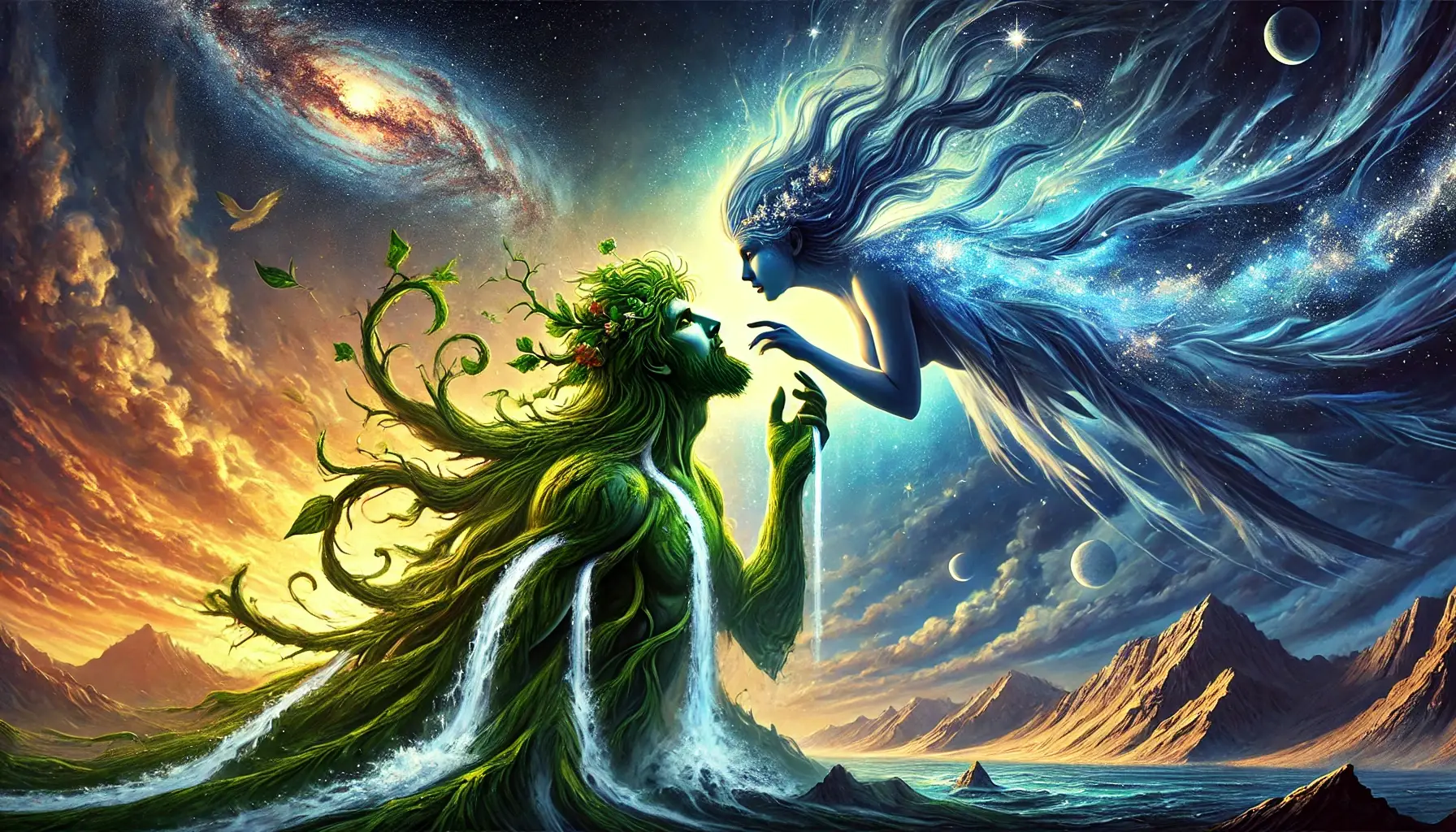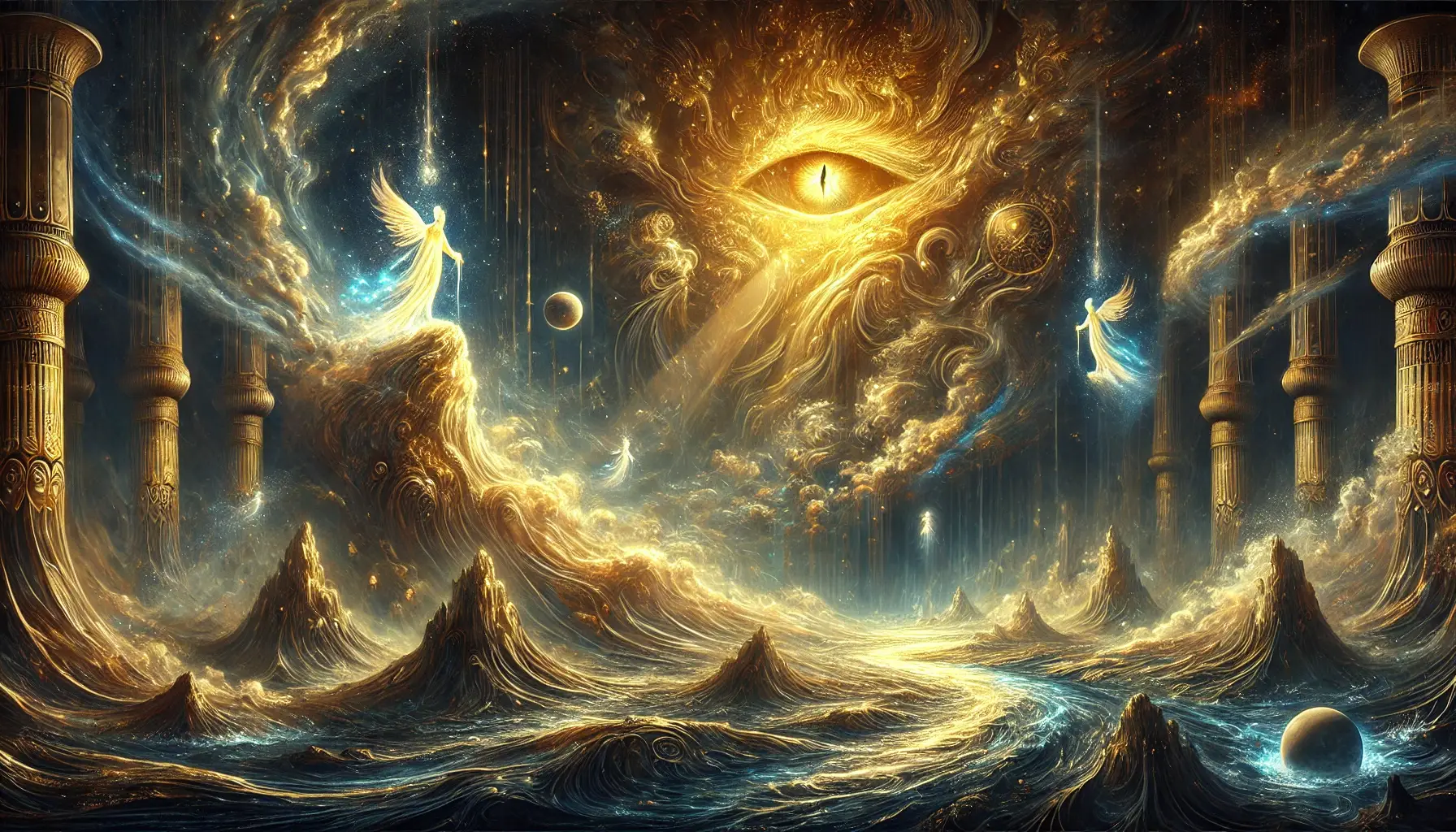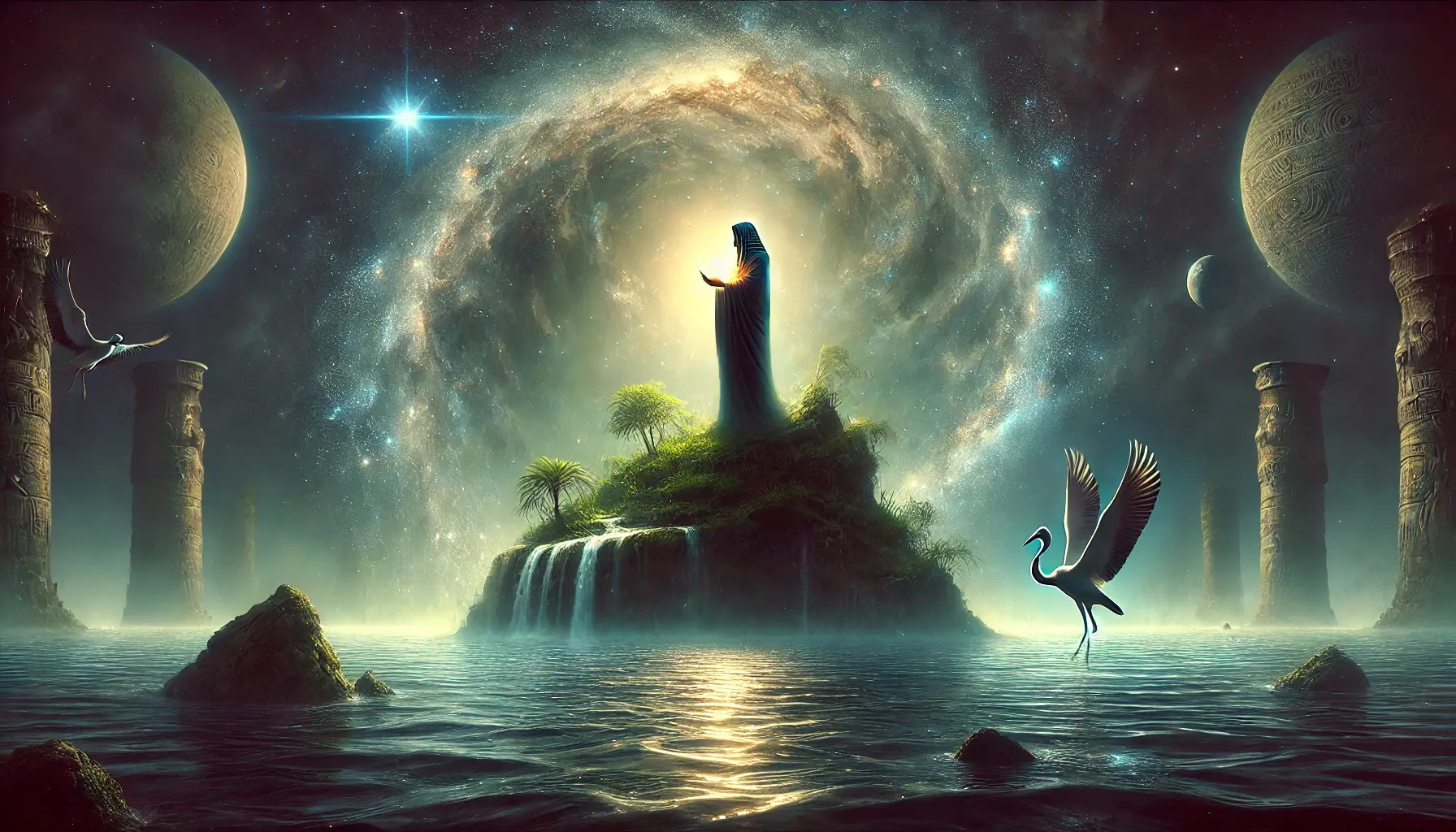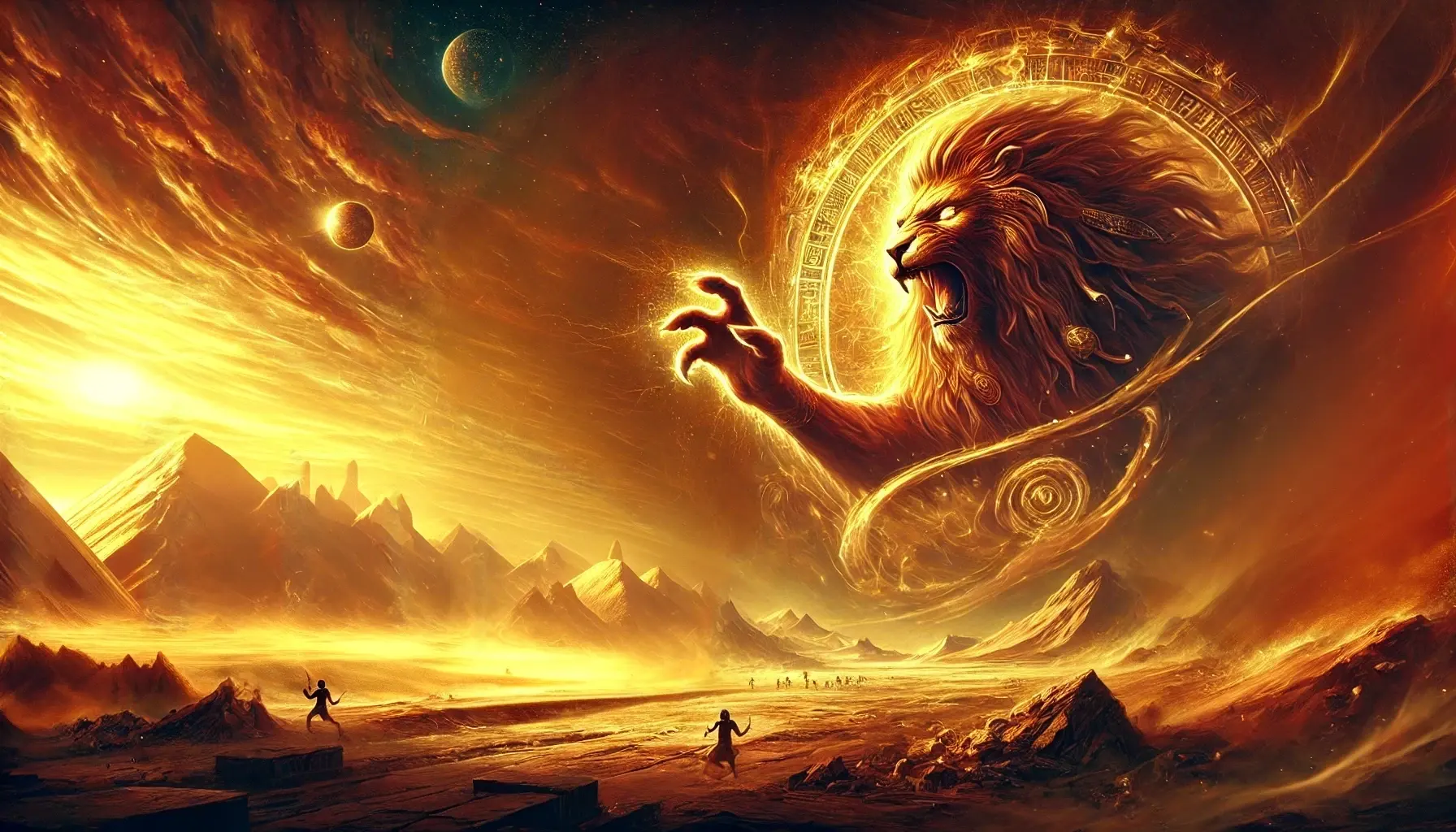The Birth of Passion Under the Cosmic Dome
In the primordial days when chaos reigned, the universe was a swirling sea of potentiality, boundless yet unformed. From this abyss emerged Atum, the self-created, who willed himself into being atop the Benben stone, a sacred hill rising from the watery Nun. With breath and shadow, he brought forth his children: Shu, the god of air, and Tefnut, the goddess of moisture. Together, they wove the fabric of creation, giving birth to Geb, the Earth, and Nut, the Sky, whose love would defy divine decree.
Geb and Nut were inseparable, their union so complete that it threatened to halt the world’s unfolding. Geb, with his verdant body, yearned for Nut’s star-strewn embrace, and Nut, her expanse adorned with celestial jewels, yearned to rest upon Geb’s fertile plains. Their love was tender yet unyielding, a force that both created and consumed. Locked in an eternal embrace, their passion stifled the spaces necessary for life to flourish.
The Wrath of Atum and the Decree of Separation
Atum, gazing upon the union of Geb and Nut, foresaw the stagnation of his grand design. Their entwined forms, though beautiful, were an impediment to the birth of time and the movement of celestial order. Summoning Shu, the god of air and balance, Atum decreed the separation of Earth and Sky.
“Divide them,” Atum commanded, his voice resonant as the first rumble of thunder. “Let the spaces between their love be the cradle of all existence. Through their pain, the world will thrive.”
Shu, though reluctant, obeyed his father’s will. With immense sorrow, he positioned himself between Geb and Nut, his presence a barrier that held them apart. Geb wept, and his tears became rivers; Nut mourned, and her sorrow fell as the first rains. Yet Shu’s resolve did not falter, for he understood that this act, however cruel, was necessary for creation’s balance.
The Birth of the Gods and the Seeds of Eternity
Though separated, Geb and Nut’s love persisted, their longing transcending the barrier imposed by Shu. From their yearning arose the gods who would populate the heavens and the earth. Nut, bending against Shu’s unyielding arms, gave birth to four children: Osiris, Isis, Set, and Nephthys. Each child was a shard of their parents’ fractured unity, a testament to love’s resilience even in the face of divine will.
Osiris, the embodiment of order and renewal, carried the promise of life; Isis, the mistress of magic, wove the threads of compassion and cunning. Set, the harbinger of chaos, mirrored the turbulence of separation, while Nephthys, the shadowed goddess, symbolized the mysteries of endings and beginnings. Through them, the cosmos found its rhythm, a dance of harmony and discord echoing the bittersweet tale of their parents.
The Celestial Pact and the Cycles of Time
Despite Shu’s vigilance, Nut and Geb sought solace in fleeting moments of union. Legend tells of Nut bending low at the horizon to touch Geb, their clandestine embrace birthing the dawn and the dusk. In this rhythm, they gifted humanity the cycles of time—a reminder that even in separation, love endures.
Atum, though stern, acknowledged the depth of their devotion. He decreed that Nut would bear the stars across her body, a luminous tribute to her love for Geb. Geb, in turn, would cradle all life within his earthy form, nurturing the beings who walked upon him. Thus, the lovers’ sacrifice became the foundation of existence, their pain transforming into a generative force that bound the cosmos together.
The Eternal Vigil of Shu
Shu, ever the mediator, bore the weight of his duty with quiet sorrow. His outstretched arms upheld the heavens, his presence a constant reminder of the cost of balance. Yet he, too, found a strange solace in his role. Through him, the boundary between Earth and Sky became a sacred space, a realm of potential where the winds whispered secrets and the sun traced its path.
On stormy nights, it is said, the winds howl with Geb’s yearning, and the rains fall as Nut’s tears. The thunderclaps are Shu’s lament, a mournful reminder of his sacrifice. Yet within this sorrow lies a quiet triumph: the world’s harmony, born from their shared anguish.
The Night’s Embrace and the Dawn’s Promise
As the ages unfolded, Nut’s celestial body became a canvas for human imagination. Her stars charted the destinies of kings and commoners alike, her constellations a map of stories and dreams. Geb, steadfast and enduring, offered the bounty of his fields and the shelter of his mountains. Together, they shaped the lives of those who revered them, their myth a guiding thread woven into the fabric of existence.
In the quiet hours of the night, when the world lay still, Nut stretched herself over Geb, her starlit expanse brushing against his rugged terrain. For a brief moment, the distance between them seemed to dissolve, and the universe held its breath. In that sacred silence, their love, though thwarted, shone brighter than any star.
The Unbroken Circle
And so, the tale of Geb and Nut endured, whispered across generations as both a caution and a comfort. Their separation, though agonizing, gave rise to the beauty and order of the cosmos. In their longing, humanity found inspiration; in their sacrifice, a reflection of life’s bittersweet truths.
One can still feel their presence in the meeting of earth and sky. At twilight, when the heavens blush with hues of gold and crimson, it is as if Nut leans down to kiss Geb farewell. And at dawn, when the horizon gleams with the first light of day, it is Geb’s tender gaze that lifts Nut toward the heavens once more. Their love, though divided, remains eternal—a silent, enduring force that holds the universe in its gentle embrace.



